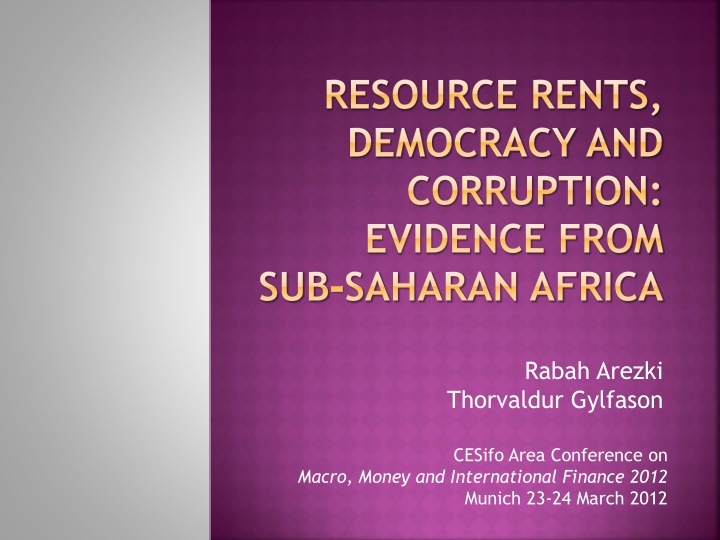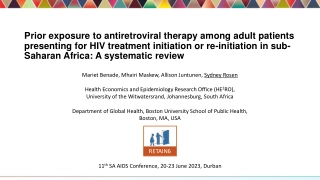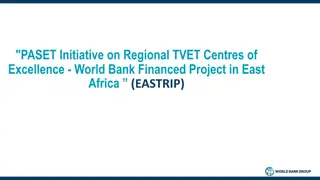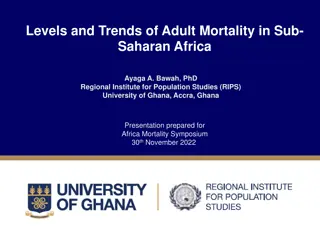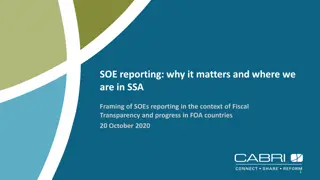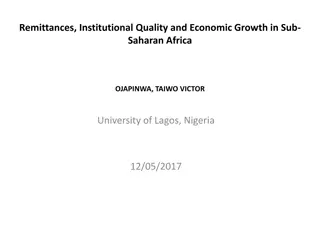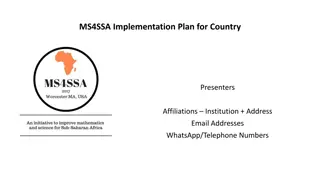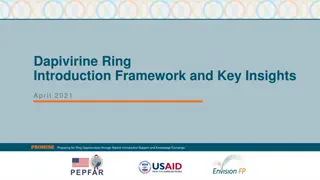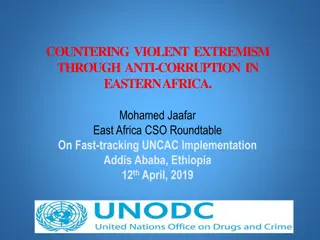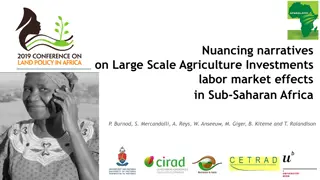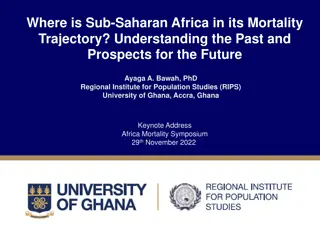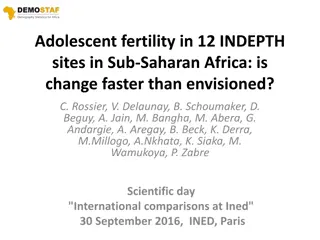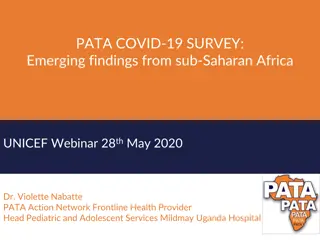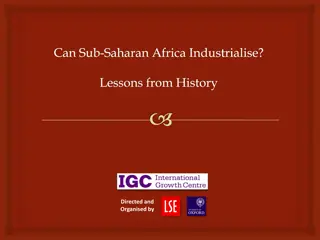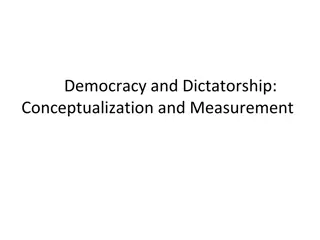Resource Rents, Democracy, and Corruption in Sub-Saharan Africa
This study analyzes the impact of resource rents on corruption in Sub-Saharan Africa, focusing on the interaction with democracy and political systems. It explores how higher resource rents lead to increased corruption, particularly in less democratic countries, while autocracy can lead to fewer internal conflicts. The study highlights the importance of good governance in managing resource rents and combating corruption.
Download Presentation

Please find below an Image/Link to download the presentation.
The content on the website is provided AS IS for your information and personal use only. It may not be sold, licensed, or shared on other websites without obtaining consent from the author.If you encounter any issues during the download, it is possible that the publisher has removed the file from their server.
You are allowed to download the files provided on this website for personal or commercial use, subject to the condition that they are used lawfully. All files are the property of their respective owners.
The content on the website is provided AS IS for your information and personal use only. It may not be sold, licensed, or shared on other websites without obtaining consent from the author.
E N D
Presentation Transcript
RESOURCE RENTS, DEMOCRACY AND CORRUPTION: EVIDENCE FROM SUB-SAHARAN AFRICA Rabah Arezki Thorvaldur Gylfason CESifo Area Conference on Macro, Money and International Finance 2012 Munich 23-24 March 2012
OUTLINE We examine the effect of the interaction between resource rents and democracy on corruption in Sub-Saharan Africa Sample of 29 countries 1985-2007 What we find: Higher resource rents lead to more corruption, and significantly more so in less democratic countries Also, surprisingly, higher resource rents plus autocracy lead to fewer internal conflicts Why? Autocrats can more easily than democrats use the rents to quell the masses
BACKGROUND In Sub-Saharan Africa, resource rents constitute a significant source of income In 2006, resource rents represented on average 11% of Gross National Income (GNI) In Congo and Equatorial Guinea, resource rents represented some 80% of GNI in 2006 Given the economic significance of resource rents and the key role governments play in administering those rents, the potential consequences of higher resource rents on corruption are important
AIMS OF THE PAPER We ask whether the impact of oil rents on corruption is independent of political systems World Bank President Zoellick (2011): you cannot have successful development without good governance This statement begs the question as to whether and how political systems affect good governance and corruption in particular
AIMS OF THE PAPER Sub-Saharan countries provide an interesting laboratory They are relatively homogeneous because of their shared history and geography They also differ importantly in terms of the quality of their political institutions The mechanisms through which resource rents affect corruption in Sub-Saharan Africa are thus likely to differ depending on their political systems
AIMS OF THE PAPER We examine with rigorous panel data techniques the consequences of the interaction between resource rents and political systems on corruption Earlier studies have primarily focused on the relationship between resource rents and corruption without taking into account the importance of the interaction between rents and political systems By contrast, we stress the interactions between resource rents and political systems
MAIN EMPIRICAL FINDINGS Redistribution via government spending following a resource bonanza depends on the political system and thus can help us understand the channels through which resource rents affect corruption in Sub- Saharan Africa Higher resource rents are conducive to corruption The effect of rents on corruption is significantly stronger in less democratic countries However, higher resource rents plus autocracy lead to fewer, not more, internal conflicts
MAIN EMPIRICAL FINDINGS These findings can be explained by the ability of political elites in less democratic countries to more effectively quell the masses through redistribution to the public We document that higher resource rents lead to more (less) government spending in less (more) democratic countries The mechanisms through which resource rents affect corruption cannot be separated from political systems
DATA The resource rents data are taken from World Bank (WDI, 2010) Unit resource rents are derived by taking the difference between world prices (to reflect the social opportunity cost of resource extraction) and the average unit extraction or harvest costs (including a normal return on capital) Unit rents are multiplied by the physical quantity extracted or harvested to arrive at total rent (Hamilton and Ruta, 2008)
DATA Democracy is measured by the revised combined Polity score (Polity2) of the Polity IV database (Marshall and Jaggers, 2009) The Polity2 score ranges from -10 to +10, with higher values indicating more democratic institutions To examine also the political competition and executive constraints channel, we use the polity sub-scores on constraints on the chief executive and political competition, ranging from 1 to 7, with greater values indicating tighter constraints
DATA The corruption score captures the likelihood that government officials will demand special payments and the extent to which illegal payments are expected throughout government tiers The score ranges from 1 to 6, with higher values indicating less corruption The internal conflict score is an assessment of political violence and its actual or potential impact on governance, ranging from 0 (very high risk) to 4 (very low risk) Source: Political Risk Services (2009)
ESTIMATION Dynamic panel data model Corruptionit= i+ Corruptionit-1+ t+ Rentsit+ Interactionit+ uit iare country fixed effects that capture unobservable time-invariant country characteristics tare year fixed effects that capture shocks common to all countries uitis an error term that is clustered at the country level and may hence be arbitrarily serially correlated within countries reflects the (short-run) marginal effect of resource rents on changes in corruption captures the marginal effect of the interaction between resource rents and country-specific Polity2 score averaged over 1985-2007
RESOURCE RENTS, DEMOCRACY AND CORRUPTION GMM estimates Lagged corruption Resource rents 1 2 3 -0.066 (0.045) -0.029* (0.016) 0.016** (0.007) -0.122*** (0.037) -0.018* (0.011) -0.127*** (0.038) -0.126** (0.011) Interaction with Polity2 Interaction with Executive constraints Interaction with Political competition Observations Countries 0.020** (0.009) 0.025*** (0.009) 599 28 599 28 599 28
RESOURCE RENTS, DEMOCRACY AND CORRUPTION: IN WORDS With GMM in lieu of OLS, the effect of resource rents on corruption becomes significant at the 10% level or 5% level A one standard deviation increase in resource rents increases corruption by about 2.3 standard deviations The effect of the interaction between resource rents and country-specific Polity2 on corruption is positive Stronger political institutions lead to less corruption following a resource boom
RESOURCE RENTS, DEMOCRACY AND CORRUPTION: IN WORDS Overall effect of resource rents is dCorruption/dRent = -0.030 + 0.017*Polity2 The overall effect of resource rents on corruption is Negative for the country with the lowest Polity2 score on average over the sample period (Senegal) i.e., more rents mean more corruption Positive for the country with the highest Polity2 score (Mauritius) i.e., more rents mean less corruption
RESOURCE RENTS, DEMOCRACY AND CORRUPTION: IN WORDS The effects of the interaction between resource rents and measures of executive constraints and political competition are positive and statistically significant at least at the 5% level By limiting executive power and enhancing political competition, stronger political institutions attenuate the negative effect of resource rents on corruption By contrast, weaker political institutions exacerbate the impact of higher resource rents on corruption
RESOURCE RENTS, DEMOCRACY AND CORRUPTION: IN WORDS If democracy effectively restrains rent seekers, thus making resource rents less prone to corruption in democracies in the face of accrued resource revenues, resource rich economies need particularly strong checks and balances to contain the potential damage from rent seeking in the face of resource booms Collier and Hoeffler (2008) Mehlum, Moene and Torvik (2006)
RENTS, DEMOCRACY, INTERNAL CONFLICTS AND PUBLIC SPENDING OLS and GMM estimates Internal conflicts (OLS) -0.367*** (0.039) Internal conflicts (GMM) -0.146* (0.078) Government spending (OLS) -0.130* (0.066) Government spending (GMM) -0.105 (0.073) Lagged dependent variable Resource rents 0.144*** (0.049) -0.045** (0.022) 602 28 0.008 (0.019) -0.003 (0.012) 599 28 0.046*** (0.017) -0.016** (0.006) 1312 39 0.017* (0.009) -0.008** (0.003) 1265 39 Interaction with Polity2 Observations Countries Note: Country fixed effects: Yes; Time effects: Yes.
RENTS, DEMOCRACY, INTERNAL CONFLICTS AND PUBLIC SPENDING The impact of resource rents on internal stability depends on the political system Resource rents reduce internal conflicts as measured by an assessment of political violence from Political Risk Services (2009) Effects of the interaction between resource rents and democracy on internal stability are statistically and economically significant In a country with the same level of democracy as in Mauritius, an increase by one standard deviation in resource rents barely improves the assessment of internal stability (0.1 standard deviation)
RENTS, DEMOCRACY, INTERNAL CONFLICTS AND PUBLIC SPENDING The impact of resource rents on internal stability depends on the political system Resource rents reduce internal conflicts as measured by an assessment of political violence from Political Risk Services (2009) Effects of the interaction between resource rents and democracy on internal stability are statistically and economically significant However, for a country with less democracy like in Senegal, an increase by one standard deviation in resource rents leads to an almost 1.2 standard deviation increase in internal stability
RENTS, DEMOCRACY, INTERNAL CONFLICTS AND PUBLIC SPENDING Whence the moderating role of political institutions in the relationship between rents and internal conflicts in Sub-Saharan Africa? Extending transfers to the population may be an effective way to quell the masses following a resource boom It may, however, prove harder for democracies to quell the masses through redistribution because of the scrutiny of government actions resulting from constraints on executive power as well as checks and balances
RENTS, DEMOCRACY, INTERNAL CONFLICTS AND PUBLIC SPENDING Resource rents increase government spending A one standard deviation increase in resource rents leads to an increase by 0.16 standard deviation in government spending Effects of the interaction between resource rents and democracy on government spending are statistically and economically significant For a country with the same level of democracy as in Mauritius, an increase by one standard deviation in resource rents decreases government spending by 0.08 standard deviations
RENTS, DEMOCRACY, INTERNAL CONFLICTS AND PUBLIC SPENDING Resource rents increase government spending A one standard deviation increase in resource rents leads to an increase by 0.16 standard deviation in government spending Effects of the interaction between resource rents and democracy on government spending are statistically and economically significant However, for a country with a level of democracy as in Senegal government spending would increase by 0.1 standard deviation
THE UPSHOT We attribute this dichotomous effect of rents and democracy on government spending to the ability of political elites in autocracies to effectively redistribute to the public in periods of resource bonanza rendered possible by the lack of scrutiny of their actions Our findings suggest that the mechanisms through which resource rents affect corruption cannot be separated from political systems
ROBUSTNESS CHECKS To ascertain that our main results are not driven by omitted variables, we further control for ethnic fractionalization Sub-Saharan Africa is the most ethnically fractionalized continent Adding to our model an interaction between resource rents and the country specific level of ethnic fractionalization, we obtain less significant estimates, but their signs and magnitudes appear virtually unchanged Our result that political institutions moderate the relationship between resource rents and corruption and internal stability survives
CONCLUSION While corruption resulting from an increase in resource rents decreases in more democratic countries, the likelihood of conflicts increases in democracies because democracies are less able to redistribute rents to the public because of the scrutiny they face Less democratic countries are able to dispense pork-barrel spending to disguise redistribution and quell the masses Need effective early warning systems to alert civil society to pending dangers Natural Resource Charter
